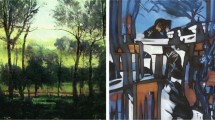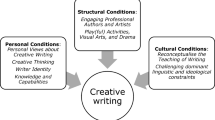Abstract
In this paper I examine a controversy ongoingwithin current Deweyan philosophy of educationscholarship regarding the proper role and scopeof science in Dewey's concept of inquiry. Theside I take is nuanced. It is one that issensitive to the importance that Dewey attachesto science as the best method of solvingproblems, while also sensitive to thosestatements in Dewey that counter a wholesalereductivism of inquiry to scientific method. Iutilize Dewey's statements regarding the placeaccorded to inquiry in aesthetic experiences ascharacteristic of his method, as bestconceived.
Similar content being viewed by others
REFERENCES
Boisvert, R. (1998). John Dewey: Rethinking our time. Albany: State University of New York Press.
Dewey, J. (1984). Democracy and education. In J. Boydston (Ed), The middle works 1899–1924 (Vol. 9, 1916). Carbondale, IL: Southern Illinois University Press.
Dewey, J. (1988). Experience and nature. In J. Boydston (Ed), The later works 1925–1953 (Vol. 1, 1925). Carbondale, IL:: Southern Illinois University Press.
Dewey, J. (1988). Qualitative thought. In J. Boydston (Ed), The later works 1925–1953 (Vol. 5, 1929–1930) (pp. 243-263). Carbondale, IL:: Southern Illinois University Press.
Dewey, J. (1990). Art as experience. In J. Boydston (Ed), The later works 1925–1953 (Vol. 10, 1934). Carbondale, IL:: Southern Illinois University Press.
Dewey, J. (1991). Logic: The theory of inquiry. In J. Boydston (Ed), The later works 1925–1953 (Vol. 12, 1938). Carbondale, IL: Southern Illinois University Press.
Dewey, J. (1991). The philosophy of the arts. In J. Boydston (Ed), The later works, 1924–1953 (Vol. 13, 1938–1939) (pp. 357-368). Carbondale, IL: Southern Illinois University Press.
Dewey, J. (1992). Philosophy's future in our scientific age. In J. Boydston (Ed), The later works 1925–1953 (Vol. 16, 1945–1949). Carbondale, IL: Southern Illinois University Press.
Diggins, J.P. (1998). Pragmatism and its limits. In M. Dickstein (Ed), The revival of pragmatism: New essays on social thought, law, and culture (pp. 207-231). Durham, North Carolina: Duke University Press.
Garrison, J. (1997). Dewey and eros: Wisdom and desire in the art of teaching. New York: Teacher's College Press.
Hickman, L. (1992). John Dewey's pragmatic technology. Bloomington, Indiana: Indiana University Press.
Jackson, P. (1998). John Dewey and the lessons of art. New Haven: Yale University Press.
McCarthy, C. (1999). Dewey's ethics: Philosophy or science? Educational Theory, 49(3), 339-359.
Mounce, H.O. (1997). The two pragmatisms: From Peirce to Rorty. London: Routledge.
Reichenbach, H. (1950). The verifiability theory of meaning. In H. Feigl and M. Brodbeck (Eds), In readings in the philosophy of science (pp. 93-102). New York: Appleton-Century-Crofts.
Shlick, M. (1946). Positivism and realism. In A.J. Ayer (Ed), Logical positivism (pp. 83-107). New York: The Free Press.
Waks, L. (1998). Experimentalism and the flow of experience. Educational Theory, 1(47), 1-19.
Author information
Authors and Affiliations
Rights and permissions
About this article
Cite this article
Johnston, J.S. John Dewey and the Role of Scientific Method in Aesthetic Experience. Studies in Philosophy and Education 21, 1–15 (2002). https://doi.org/10.1023/A:1014457300559
Issue Date:
DOI: https://doi.org/10.1023/A:1014457300559




